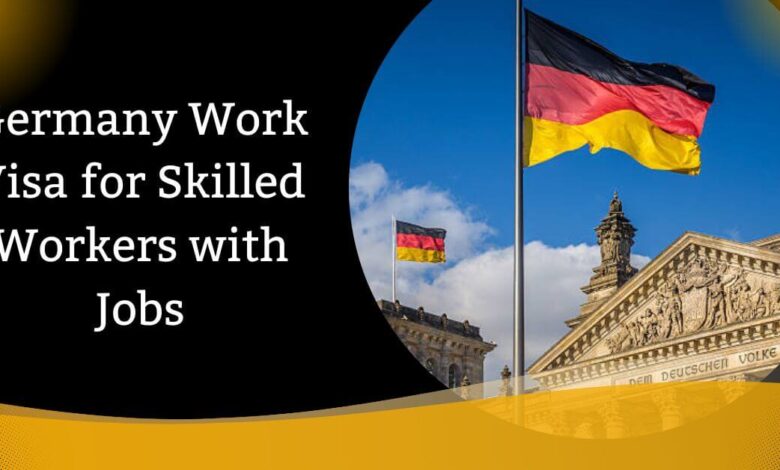Germany Work Visa for Skilled Workers with Jobs – Apply Now

Graduating from a German university is a significant accomplishment, but if you don’t find employment right away, don’t worry. Germany offers flexible visa options for graduates who wish to stay, job search, and eventually work.
Overview:
If you finish your Bachelor’s or Master’s degree in Germany, you may qualify for:
- A Job-Seeker Visa (to look for employment)
- An EU Blue Card (for highly qualified workers)
- A General Employment Visa (for other skilled workers)
- A Freelance Visa (for self-employed professionals)
Germany strongly encourages qualified graduates to stay and contribute to its workforce.
Types of German Work Visas for Graduates:
1. Job-Seeker Visa:
- Purpose: Stay in Germany up to 18 months after graduation to find a job.
- Eligibility: Must have completed a recognized degree in Germany.
- Key requirement: Proof you can financially support yourself (~€947/month minimum in 2026).
- Work rights: You can work part-time (up to 20 hours/week) while job hunting.
2. EU Blue Card:
- Purpose: For highly qualified graduates with a concrete job offer.
- Eligibility:
- Recognized degree.
- The candidate must earn an annual gross salary of at least €45,300 in regular fields or €41,041.80 in shortage fields in 2026.
- Duration: 4 years (renewable), fast track to permanent residency.
- Benefits: Fast-track PR after just 33 months (or 21 months with B1 German).
3. General Employment Visa:
- Purpose: For qualified professionals who have a job offer but don’t meet Blue Card salary levels.
- Eligibility:
- It is a recognized degree or professional qualification.
- The employment contract is relevant to your qualification.
4. Freelance Visa:
- Purpose: For graduates planning to work independently (e.g., IT, designers, consultants).
- Eligibility:
- You need to provide proof of financial resources.
- I need proof of freelance clients or projects.
- Income expectation: Around €4,000–€5,000/month to ensure financial security.
Eligibility Criteria: Who Can Apply?
To stay in Germany after graduation, you must:
Hold a recognized German university degree
Have sufficient financial resources (~€11,364 in a blocked account recommended)
Have valid health insurance
Intend to find work related to your field of study
Documents Required:
| Document | Details |
|---|---|
| Valid Passport | Must be valid for at least 6 months |
| Proof of Graduation | Degree certificate or official letter |
| Health Insurance | Private insurance until you find employment |
| Financial Proof | Blocked account, scholarship, or sponsor letter |
| Proof of Accommodation | Rental contract, hotel booking, etc. |
| CV/Resume | In German format (Europass optional) |
| Motivational Letter | Explain your job search plan in Germany |
| Passport Photos | Biometric standards |
| Application Form | Fully completed visa form |
| Visa Fee | €75 fee (payable during application) |
Application Process for Germany Work Visa for Skilled Workers with Jobs:
- Please collect all the necessary documents and verify that they comply with the embassy’s requirements.
- Book an appointment at the nearest German Embassy/Consulate.
- Please attend your visa interview and ensure you bring both the originals and copies.
- Pay the visa fee (€75 for national visas).
- Wait for processing: It can take 6–12 weeks, depending on your case.
- Receive your visa, travel to Germany (if applying from abroad), and register your address.
Check Also: Work Visa Sponsorship Jobs in Germany – Apply Now
Bonus Tips to Maximize Your Chances:
Start Early: Apply at least 3 months before your student residence permit expires.
Learn Basic German: Even B1 German can make your job search MUCH easier.
Tailor Your CV and Cover Letter: Match German standards.
Target Shortage Occupations: IT, engineering, healthcare, and STEM fields are in huge demand.
Register on Job Portals: Xing, Stepstone, Indeed Germany, LinkedIn.de.
Network Actively: Join career fairs, alumni groups, and LinkedIn groups.
Use University Career Services: Many universities offer job counseling for alumni!
Conclusion:
Germany offers fantastic pathways for international graduates to launch their careers. Whether you are seeking a full-time job, a freelance project, or simply need more time to search for a job, options such as the Job-Seeker Visa, EU Blue Card, and General Employment Visa can greatly enhance your future prospects.
Frequently Asked Questions:
What is the minimum salary for a skilled worker visa in Germany?
The work contract must be valid for at least six months. You must earn a minimum salary of €43,800 if it’s a regular profession. You must earn at least €39,682.80 if you work in a bottleneck profession or are a new entrant to the labor market.
Who qualifies as a skilled worker in Germany?
Professionals with vocational training or professional qualifications, also known as “highly qualified” individuals with university degrees, and those undergoing vocational training in Germany are referred to as “skilled workers” or “Fachkräfte.” This term refers to individuals who are either studying or undergoing vocational training in Germany.
Is IELTS required for a German work visa?
The good news is IELTS is not required to qualify for a German work visa. The English language requirements are dependent on the type of job you are applying for. If the job is for a position that involves traveling around the world, then a certain level of English proficiency is required.




